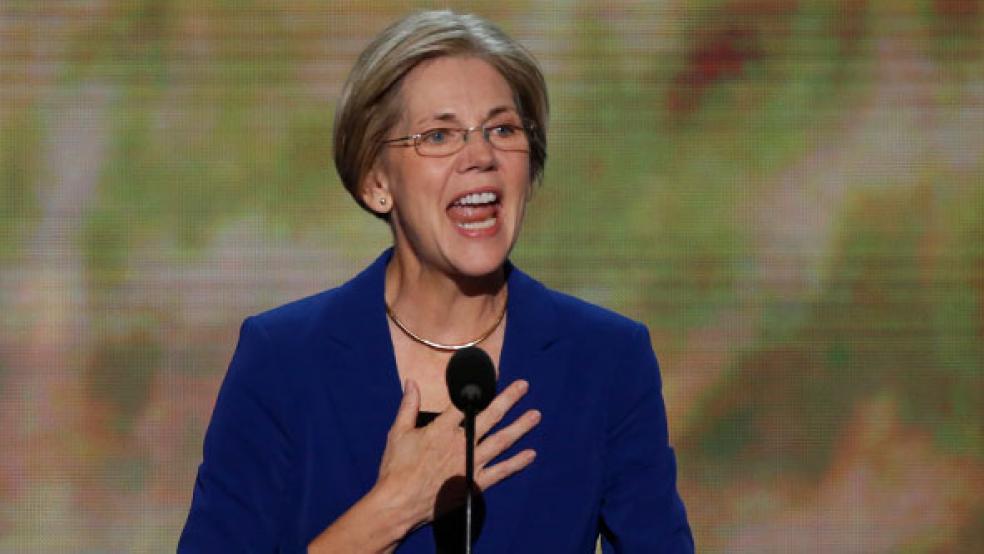CHARLOTTE, N.C. – For bank lobbyists and some conservative activists, Elizabeth Warren is the hated lightening rod, the architect of the Consumer Financial Protection Bureau and the original proponent of values that the Republican national convention turned into President Obama’s “you didn’t build that” moment.

Rather than run from those charges, which fact-checking organizations immediately branded a deliberate misrepresentation of a speech that broadly described how private sector progress depends on the schools, roads and science financed by the public, Obama doubled down. He gave Warren, the Democratic Senate candidate in Massachusetts, a featured slot at Wednesday night’s session of the Democratic convention.
And she stayed true to the populist themes that has made her the darling of the liberals and leftists across the country but left her slightly behind in her race against incumbent Scott Brown, who won a mid-term election in 2010 to replace Teddy Kennedy, who helped defined American liberalism for more than 30 years until his death from brain cancer.
“People feel like the system is rigged against them. And here’s the painful part. They’re right,” she told the nearly 6,000 delegates. “The system is rigged. Look around. Oil companies guzzle down billions in profits. Billionaires pay lower tax rates than their secretaries. And Wall Street CEOs, the same ones who destroyed millions of jobs, strut around Congress demanding favors. Does anyone have a problem with that? I do, too,” she said to loud cheers from the crowd.
There’s a lot riding on first-time candidate Warren’s race against Republican Scott Brown, who won a narrow victory in a 2010 special election. Failure to retake the seat that for more than three decades was held by Teddy Kennedy could tip control of the Senate to the Republicans and turn Obama’s second term, should he win, into an endless stream of vetoes. If the president and Warren lose, the signature achievements of his first term – not just the CFPB but his health care reform law – could be repealed.
A Harvard law professor and expert on personal bankruptcy law, Warren entered the Senate race after failing to secure the nomination to head the CFPB, which she personally helped lobby into the Dodd-Frank financial services reform law. For the first time, a single federal agency will police the wide array of financial service products that average individuals use, from credit cards and home mortgage contracts to pay-day lenders and credit counseling firms.
Though abusive practices by firms in those industries contributed to the severity of the 2008 financial meltdown, the broader banking community and the U.S. Chamber of Commerce opposed creation of a new oversight agency and launched numerous attacks against Warren and the populist rhetoric she employed to justify its need. While Republicans in Congress have vowed to eliminate the CFPB, party nominee Mitt Romney has only said he would rein it in.
The populist rhetoric Warren uses to defend the agency doesn’t appear to have swung most liberal voters of Massachusetts to her side. The latest polls show Brown holding a slim lead even though Warren has outpaced him on campaign contributions, raising $28.3 million compared to his $19.5 million, according to the Center for Responsive Politics. Her edge came largely from raising $12.1 million from small contributors, many of them from outside Massachusetts, compared to Brown’s $2.9 million.
Brown has sought to seize the middle ground from the more populist Warren by taking moderate and bipartisan positions on some issues, although not the CFPB. He hasn’t launched personal attacks against the president, who is expected to win the state by a wide margin. And after Michelle Obama’s speech to the convention Tuesday night, he refused to compare it to Ann Romney’s speech at last week Republican convention, according to the Boston Herald.
“I’m not into comparisons,” he told the paper. “They’re both different people. They have different beliefs, different upbringings, and I thought they both did really well.”
Warren is attempting to ride into office on a tide of outside money raised from left-of-center Democrats across the country. While she was still contemplating a run for high office last August, she told a college audience that “there is nobody in this country who got rich on his own. Nobody.”
Over a million people viewed a YouTube video of the entire speech, which extolled how business benefits from government-provided services. “You built a factory and it turned into something terrific or a great idea? God bless. Keep a big hunk of it,” she said. “But part of the underlying social contract is you take a hunk of that and pay forward for the next kid who comes along.”
Massachusetts voters, who are generally more liberal than the rest of the country, are also independent-minded and have often backed Republicans who chart an independent course. Warren did make an effort in her brief speech to lay claim to the middle ground.
Americans “are tough, resourceful and creative,” she said. “If we have the chance to fight on a level playing field – where everyone pays a fair share and everyone has a real shot – then no one can stop us.”
But she couldn’t help taking a populist dig at the Republican challenger and his running mate. “Romney wants to give billions in breaks to big corporations – but he and Paul Ryan would pulverize financial reform, voucher-ize Medicare and vaporize Obamacare,” she said.





